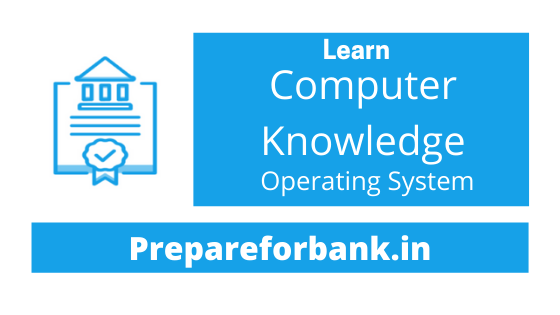Computers are gaining importance in IBPS or SBI exams and the Operating system is one of the key components of computer Knowledge. It’s very essential to know the basics of Operating Systems so that candidates can answer correctly in exams.
Also, learn about the History of Computers and Computer Hardware

Table of Contents
What is an Operating System?
An operating system is a primary software that manages all the hardware and other software on a computer. The operating system, also known as an “OS”, handles input and output devices.
It is stored on the primary hard drive inside the computer. Without an operating system i.e. OS, the computer is useless. OS use device drivers designed by hardware creators which are used to communicate with their devices.
Objectives of Operating System
- To make the system convenient to use in an efficient manner.
- To provide users a convenient interface to use the system.
- To act as an intermediary between the hardware and its users, making it easier for the users to access and use other resources.
- To also manage the resources of the system.
- To provide efficient sharing of resources among users and programs.
Computers mainly use operating system types such as Windows, Linux, or Mac OS which are popular but each is different. Which provides mostly a graphical user interface i.e. GUI.
This includes a desktop and the ability to manage files and folders.
The operating system serves as a computer’s fundamental user interface and it significantly affects how it interacts with the device.
For example, some may prefer to use a computer with an X operating system instead of windows based PC. Whereas some may prefer an Android-based smartphone or iPhone which has iOS.
Below are the types of operating system
Batch Operating System
In the Batch operating system, access can be given to more than one person;
The respective jobs are submitted to the system for execution.
The Jobs get executed in batches. Jobs are put in the queue by the system on the basis of first come first serve and then executes one by one.
when all the jobs get executed users collect their respective output.
Multiprogramming Operating System
A multiprogramming operating system is an extension to batch processing where the CPU is kept always busy. There are two types of system time that each process needs i.e. CPU and IO time.
In a multiprogramming environment, for the time a process does its I/O, the CPU can start the execution of other processes. Thus, the efficiency of the system increases.
Multiprocessing Operating System
In Multiprocessing operating system, Parallel computing is achieved.
The system can execute more than one process at the same time as there is more than one processor. This will increase the result/output of the system.
Real-Time Operating System
In Real-Time operating system, a Job is supposed to be completed within a certain deadline else a huge loss will be there or if the result comes then it will be completely useless.
Operating systems come preloaded/installed whenever one buys any computer/system. There is 3 most common OS used for personal computers:
Microsoft Windows, Mac Operating system, and Linux. Modern OS lets you use GUI i.e. graphical user interface which lets you use Input devices such as a mouse to click, buttons, and menus. Everything is clearly displayed on the screen using graphics and text.
Following are some basic and important functions of the operating system
- Memory Management
- File Management
- Processor Management
- Device Management
- Security
- Job Accounting
- coordination between software and users
Memory Management – Memory Management refers to the management of main or primary memory where main memory can be a fast storage place so that it can be accessed directly by the CPU. It also allocates memory when the process requests it to do so.
File Management – It helps in organizing files into directories for easy navigation and usage. This also keeps track of information, location, status and uses etc.
Processor Management – In Multiprogramming, the Operating system decides which process will get processor when and for how much time.
This process is called Processor management.
Device Management – Operating system manages device communication. Keeps track of all device. It also decides which process gets which device when and for how much time.
Security – It provides unauthorised access to data and programs by means of passwords and other techniques.
Job accounting – It keeps track of various jobs used by resources and users.
Coordination between software and users – Coordination and assignment of compilers, assemblers, interpreters, and other software to the various
users of the systems.

